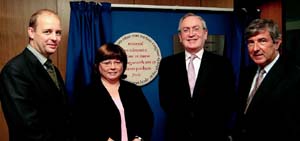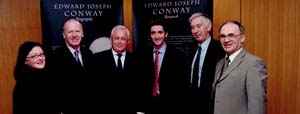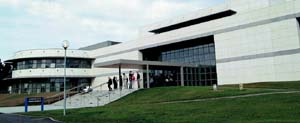| 2004 |

|
YEAR BOOK |
Conway Institute of Biomolecular and Biomedical Research
|
Conway Institute of Biomolecular and Biomedical Research
|




Proteome Research Centre
The Conway Institute Proteome Research Centre, under the leadership of Prof. Steve Pennington, was launched with a symposium on 3rd�4th June 2004. The programme included lectures from world-leaders in the field of proteomics � including Prof. Denis Hochstrasser, Swiss Institute of Bioinformatics; Dr Scott Patterson, Amgen Inc., California; and Prof. Daryl Pappin, Proteome Research Centre, Applied Biosystems, Framingham, USA.
Publications
In collaboration with Prof. Salvador Moncada of University College London, Dr Cormac Taylor recently published a paper in Science describing how cells detect oxygen levels. When the flow of blood to an organ or tissue is disrupted, cells become starved of oxygen. The way cells respond to this hypoxia may have profound implications in a range of conditions, including inflammatory disease and cancer. Understanding this mechanism is key to identifying new therapeutic targets in these diseases. Entitled 'Redistribution of intracellular oxygen in hypoxia by nitric oxide: Effect on HIF1 alpha', this paper describes how the body's natural defence against hypoxia is affected by the presence of nitric oxide.
Grants
The Conway Applied Neurotherapeutics research group, led by Prof. Ciaran Regan, was awarded �7.7 million by Science Foundation Ireland (SFI) to support research that will also involve scientists from Trinity College Dublin and the Neuroscience Discovery Group of Wyeth Research. The project will focus on disorders of the brain, including Alzheimer's disease, schizophrenia and depression. This investment is part of an ongoing effort to attract and support substantial industrial involvement in Irish research.
The marriage of chemistry and biology is clearly evident in the SFI Investigator award to Dr Paul Murphy for his research on angiogenesis inhibitors. Angiogenesis describes the growth of new blood vessels in the healthy body and in disease. Dr Murphy and his co-workers are involved in devising and making new compounds that will act as inhibitors of angiogenesis. His collaborator, Dr Kathy O'Boyle, will then investigate the biological mechanism by which the compounds operate. The ultimate goal of the research is to develop new inhibitors of angiogenesis in the body.
Dr Bernard Allan recently joined the Conway Institute on a SFI Investigator award. He returns to Ireland from California, where he worked in Metabolex Inc., a biopharmaceutical company focusing on drug treatment for type II diabetes. Insulin is a hormone involved in converting sugars and other food into energy. Diabetes type II occurs when the body either does not have enough insulin or cannot use it properly. Dr Allan's research will concentrate on molecules involved in the control of insulin uptake into muscle cells with a view to finding new treatments for the disease.
Prof. Des Higgins initiated his SFI Investigator award on taking up position as Chair of Bioinformatics in the Conway Institute. His project will focus on the development of protein sequence alignment methods, and will ultimately provide software for use in experimental biology. Prof. Higgins developed ClustalW, one of the most highly cited and widely used programmes in biology.
Awards
Dr William Gallagher was named the BACR/AstraZeneca Young Scientist of the Year for 2004. This prestigious award is given to a scientist under 35 who demonstrates excellence in cancer research. Dr Gallagher's research investigates the mechanism and role of a family of proteins called fibulins in healthy and diseased states, with particular focus on the role of fibulin-1 and -4 in cancer. He will give an invited seminar at the 2004 British Cancer Research Meeting.
New Principal Investigators
Prof. Stephen Pennington � proteomics
Prof. Des Higgins � bioinformatics
Prof. Paul McKeigue � genetic epidemiology
Prof. Helen Colhoun � genetic epidemiology
Dr Bernard Allan � type II diabetes
Dr Jens Nielsen � computational & experimental biology
Dr Dominic Walsh � neuroscience
Dr Lorraine Kyne � infection & immunity
Contact: Elaine Quinn, Communications & Education Officer, Conway Institute of Biomolecular and Biomedical Research, University College, Belfield, Dublin 4;
E-mail: [email protected] ; Web: www.ucd.ie/conway